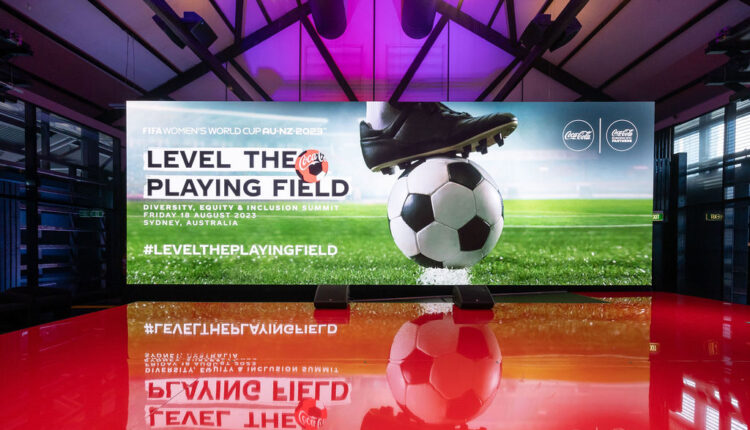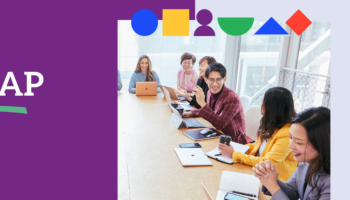Off the back of the FIFA Women’s World Cup 2023™, we partnered with Coca-Cola to bring to life their vision to expand the momentum for gender equity more broadly into our workplaces and society. We know this was a World Cup like no other, and we have to celebrate the progress and milestones that were achieved, but we still have a long way to go.
With that in mind, the Summit brought to light the relevance of DEI in today’s society, acknowledging that everyone is at a different stage of the journey, but also understanding that there are some misconceptions that are hindering progress. It was also important to bring the attendees on the journey to imagine how our workplaces and society could be if we became truly equitable: people would definitely be happier, resulting in companies performing better, which would end up transforming society as a whole.
How can we level the playing field?
To truly shift the needle in achieving gender equity, we need to acknowledge that a narrow subset of the population was taken into consideration when most of our business and societal systems were established. As such, it’s time to stop trying to fix the player and actually do something to change the field they play on.
The Level the Playing Field DEI summit provided a forum to give visibility and fuel progress towards a level playing field for women and underrepresented groups across business and society, painting a roadmap of how we can get there through three key pillars:
- Societal Education: Education is the first step in creating transformational change. It enables the foundations of awareness to be built and equips individuals with the understanding that is essential to fuel action. Through education, we can empower individuals with tools to address societal challenges, fostering a more inclusive and equitable world.
- Opportunity Creation: Research shows that when women have access to economic resources, they are more likely to have greater decision-making power and control over their lives. Providing women with meaningful employment that is relevant to their individual circumstances and access to credit, financial services, and business training can help promote economic empowerment and contribute significantly to a more balanced and equitable society.
- System Transformation: To drive substantial and lasting change, we must undergo systemic transformation. This means taking a hard look at our policies, regulations, and established systems that, when created, were designed without properly accounting for our full, diverse population. Systemic transformation is not a short-term effort; it’s a dedicated commitment to building an environment where every individual, regardless of their background, consistently has access to the opportunities they rightfully deserve. It’s the path towards a society where true equity isn’t the exception but the guiding principle.
How can we empower others to be the change?
Together with Coca-Cola we gathered influential voices from around the world to explore how we can achieve true gender equity, by addressing the systems and cultures that perpetuate inequality. Such as: Malala Yousafzai (Nobel Peace Prize Winner and Activist), Damien Gammel (CEO Coca-Cola Europacific Partners), Dylan Alcott (Paralympic Gold Medalist & Disability Advocate), Munir Naji (Managing Director, Citibank Europe & Ireland), amongst others.
It was really powerful to witness these change-makers from varied walks of life, who wouldn’t usually share the stage, gathered in one room, igniting inspiration, presenting challenges, and motivating attendees to harness their own power for change. These were renowned voices with the ability to achieve and influence on a grand scale, but their brief was this: How can we translate this momentum into our everyday lives?
Here are a few of the actions that you can take to contribute to a more equitable future:
- Use your voice: The cost of silence is high. When we find the courage to speak out, we not only address our personal concerns but also actively contribute to a shared mission. One voice can be loud but when we all speak up together, it is deafening.
- Be intentionally inclusive: If we don’t intentionally include underrepresented groups, the system will unintentionally exclude them, as it wasn’t originally designed with them in mind. How can you embed inclusive behaviours into your day to day?
- Question your own bias: What is your current perception about what people with disabilities can achieve? Challenge yourself to see disabilities beyond a weakness/limitation; more often than not, our low expectations are the reason people with disabilities feel unseen and unheard. When representation is visible, it becomes a powerful force for change.
- Be an ally: Each of us has the capacity to be the ally someone needs and allies have the power to change one person’s life, but also ignite a positive ripple effect for others that share the same lived experiences. Begin by questioning the role that we have at home, and how we treat our colleagues in our workspace.
Session Spotlight: Shifting the Goalposts
Our Managing Director, Sarah Liu, led the “Shifting the Goalposts” session, along with panellists: Alisha Fernando (Head of Diversity and Inclusion for the APAC region at Bloomberg), Luli Adeyemo (Director of the TechDiversity foundation), Munir Nanji (Head Central Europe & Ireland at Citi and co-chairs the Women), Tameka Harper (Global Chief Diversity, Equity and Inclusion Officer at Coca-Cola).
Together, they discussed how individuals and organisations can implement actions that propel diversity, equity, and inclusion outcomes forward to level the playing field for those who are disadvantaged.
Here are some actionable insights from the session:
- Drive accountability: Where you put your intention is where you will see progress. Hold yourself accountable to these intentions by creating metrics and objectives that are embedded into your organisational strategy. Track, measure and optimise.
- Start with Inclusion: When you incorporate inclusion into your organisation, the D and E will organically follow. A good starting point to foster inclusion is to ask: do our people feel welcome, safe, valued and respected?
- Develop data-driven strategies: Systemic inclusion starts with robust policies. Develop data and give an evidence-based approach to performance management and employee relationship data. Don’t be scared to look at data sets that paint an unfavourable image.
- Know Your People: We should spend as much time as we do trying to understand our customers trying to understand who our workforce really is. That’s how you get equity.
- Foster a Sense of Belonging: Having a sense of belonging matters. You can have an inclusive environment, but it doesn’t mean much without a sense of belonging. People need psychological safety.
“Levelling the playing field does not sideline merit, it enables us to take the best players from all corners, assemble an all-star team and win any game that we set our mind to!”
– Sarah Liu, Managing Director, TDC Global
The biggest takeaway from the day was the common thread throughout all sessions: it’s time to take meaningful action and to stop mistaking talk for action and action for progress. We need to treat DEI as any other business priority: with tangible and measurable objectives, strategies and accountability measures. How will you contribute to leveling the playing field?







